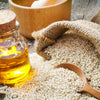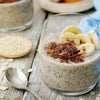Protect your heart with this sweet spice

Cinnamon is more than a fragrant, sweet seasoning to enhance buttered toast, hot oatmeal, or creamy yogurt. For centuries, this ancient aromatic spice was prized by healers in the ancient Egyptian, Ayurvedic, and Traditional Chinese healing systems to treat a host of ills, including coughs, infections, and arthritis.
While it’s undeniably a long way from ancient Egypt and Asia to your modern-day kitchen table, cinnamon has maintained its reputation for enhancing health. Let’s see why cinnamon has been revered since antiquity – when it was considered a gift fit for a king. Fortunately, you no longer have to be of royal lineage or rich to enjoy the benefits of cinnamon.
Nourish a healthy heart with cinnamon
The active constituent in cinnamon, cinnamaldehyde, scavenges free radicals that would otherwise contribute to oxidative damage to tissues and cells, setting the stage for heart disease. Cinnamaldehyde is also anti-inflammatory, allowing it to work against the inflammation at the root of heart disease. In addition, it dilates blood vessels, promoting healthy circulation, lowering blood pressure, and increasing the function of beneficial nitric oxide. So, it’s no surprise that cinnamon has been linked to a reduced rate of heart disease.
In addition, a systematic review published in 2021 in Critical Reviews in Food Science and Nutrition showed that cinnamon supplementation decreased total cholesterol, fats in the blood, LDL cholesterol, blood sugar, and waist circumference! And it didn’t require heaps of cinnamon to accomplish this feat. A mere 1500 mg of powdered cinnamon daily (about three-fourths of a teaspoon), caused researchers to praise the beneficial effects as “robust.” Finally, a separate 2020 study found that supplementation with cinnamon increased antioxidant levels while significantly reducing markers of inflammation. So, go ahead and add cinnamon to recipes. Your heart will thank you for it.
Cinnamon may have blood sugar lowering and antiobesity properties
Some researchers believe that cinnamon may help to control after-meal blood sugar “spikes” and decrease blood sugar levels in people with type 2 diabetes. When 60 people with type 2 diabetes were supplemented with cinnamon for 40 to 120 days, they displayed lower blood sugar - along with improvements in other markers of metabolic health. However, other studies have shown that cinnamon doesn’t seem very effective when lowering hemoglobin A1c (an important indicator of blood sugar control over time).
Clearly, more study is needed to explore these puzzling results. Still, some researchers report that cinnamon may help the body cope more easily with high-fat meals. It’s worth noting, too, that inhaling cinnamon essential oil is believed to help control food cravings - especially for sweets. This may help discourage obesity, which is a risk factor for both prediabetes and heart disease.
Don’t overlook aromatherapy and topical benefits from cinnamon bark essential oil
Cinnamon is also available as an essential oil. When inhaled by way of an aromatherapy diffuser, cinnamon oil is believed to bring energy and clarity to the mind while cleansing and scenting the air. After diluting cinnamon oil half-and-half with a carrier oil such as olive or coconut oil, you can use it topically on the skin for minor irritations, rashes, and pimples.
Cinnamon oil may even inhibit the growth of Candida albicans (the yeast responsible for stubborn toenail fungus), offering up a pleasant, fragrant way to treat an unsightly problem. Check with your integrative doctor before using cinnamon essential oil, and remember: As with all essential oils, cinnamon oil should not be taken internally.
Enhance recipes with sweet, savory cinnamon
Because of its sweet taste, cinnamon makes a good sugar alternative. You can sprinkle powdered cinnamon liberally on oatmeal, cereals, yogurt, and baked apples - or add a stick to hot cider or punch. You can also use cinnamon in savory meat dishes, such as poultry, beef curry or shepherd’s pie. Enhance baked butternut squash with cinnamon and honey or maple syrup for an indulgent autumnal treat.
Incidentally, there are two primary types of cinnamon. Cassia cinnamon, or Chinese cinnamon (Cinnamomum aromaticum) is the most common and affordable variety. But it can be high in coumarin, a natural blood-thinner that can be harmful in large amounts. Ceylon cinnamon, or “true” cinnamon (Cinnamomum verum), is believed to be more potent, as well as lower in coumarin. While it is not as readily available as Cassia cinnamon, it can sometimes be found in health food and specialty stores.
While cinnamon in amounts normally found in food is generally recognized as safe, check with your integrative healthcare provider before using cinnamon supplements, extracts, or essential oils.
Cinnamon was traditionally believed to attract wealth. But, as studies have shown, it’s likely that cinnamon and cinnamon oil can help attract something even better: health. And it’s impossible to put a price on that. Clearly, cinnamon makes a great addition to a healthy diet.
Sources for this article include:






